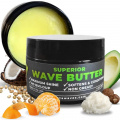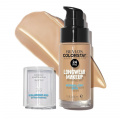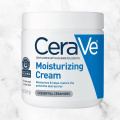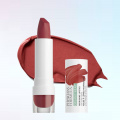How to Increase White Blood Cells and Supercharge Your Defenses
Check out this article and learn to unlock effective methods and nutritional strategies on how to increase white blood cells and strengthen your immune system.
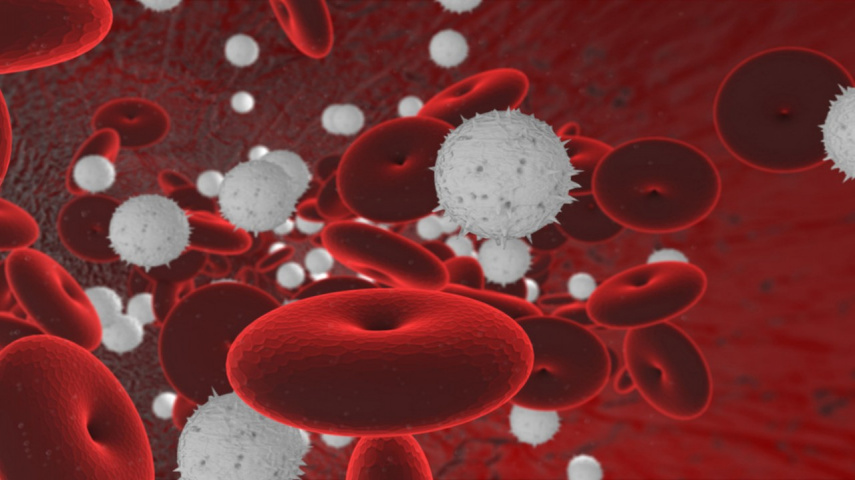
White blood cells, also known as leukocytes, are essential components of our immune system as they defend the body from diseases, infections, and foreign substances (antigens). It is vital to understand how to increase white blood cells or at least maintain their levels to help boost the immune system. These cells play a major role in fighting exposure to all environmental antigens, day in and day out. Whether it be a simple cold or a severe infection, when the WBCs fail at their task, you will fall sick (1). It's overwhelming to think how the chaos at such a micro-level could be the reason for your harmonious health at large.
That's why, it is imperative that you know how to increase white blood cell count through simple measures like nourishing food and healthy habits. Keep reading to find out some of the best foods to increase white blood cells.
What Are White Blood Cells and Their Function?
White blood cells are the infection fighters that form the first line of defense for your health. They embody what you refer to as immunity. Also known as leukocytes, WBCs come in various types, each with a specific function. These cells form a small percentage of the blood but are essential to being healthy—any minor derangement, whether an increasing WBC or low WBC count, can cause significant health issues (1),(2).
To comprehend the functions of white blood cells, picture a bustling metropolis where white blood cells serve as the security force.
- Neutrophils, eosinophils, and basophils are like the city's rapid response team.
They swiftly rush to the scene of the infection to control and kill the invading microbes. While neutrophils fight bacteria and fungi, eosinophils handle parasites, worms, and allergens (mites, pollen, dust, etc.), and basophils secrete histamine (a chemical produced in the body during allergies) to orchestrate the allergic reaction.
- Monocytes act as the city's janitors and simultaneously clean up the resultant debris and dead microbes. They do this by transforming into macrophages.
- The lymphocytes are akin to the city's intelligence agents. B cells, T cells, and natural killer cells are the three subtypes.
B cells make antibodies, which are like miniature soldiers designed to attack specific antigens. On the other hand, T cells can attack infected cells directly, eliminating threats from within.
- The natural killer cells act as watchful defenders, spotting and eliminating cells that are more severely affected and are spreading fast—cancer cells or virus-infected cells. They attack our bodies like superheroes, unleashing a wave of toxins on these cells and ensuring that no harmful substances remain.
Leukocytes are skilled at distinguishing between your own cells and foreign invaders, quickly identifying and neutralizing threats while causing the least amount of harm to healthy tissue (1),(2). The significance of white blood cells cannot be overstated. Hence, learning about how to increase white blood cells in today’s polluted environment is worth it.
What Causes High White Blood Cell Counts?
White blood cells form your body’s immunity. Increasing WBC is indicative of a state of injury/inflammation in the body that requires the immune system to step up. When your body summons an army of white blood cells beyond the usual numbers, it's a clear sign that trouble is brewing.
The average number of WBCs per microliter of blood ranges from 3,500-10,500. Leukocytosis, or increased WBC count, is suggested when the number shoots beyond 11,000 per microliter of blood. The causes could be anything from physical to emotional to autoimmune (3).
Causes of Increasing WBC
- Neutrophilia
It is the most common type of leukocytosis, characterized by an increase in neutrophils, the most abundant white blood cells. This happens as a reaction to stressors (like physical or emotional stress, infection, medications, trauma, and smoking) or autonomously in specific conditions like certain leukemias (chronic myeloid leukemia).
Chronic inflammation, pregnancy, obesity, and certain diseases can lead to persistent neutrophilia for a prolonged period.
- Eosinophilia
A rise in eosinophils is observed in diseases like cancer, inflammation, infection, parasite infection, autoimmune disorders, and allergies. Medications can also contribute to eosinophilia.
- Basophilia
Basophils increase in inflammatory conditions, viral infections, hormonal imbalances, bone-marrow disorders, and allergic (pollen, dust, or mite allergy) or anaphylactic (bee sting) reactions.
- Lymphocytosis
Lymphocyte overproduction can be benign (in children) or deadly (in the form of cancer). It is caused by viral infections, hypersensitivity reactions, leukemia, or lymphomas.
- Monocytosis
This increase in monocytes can be associated with chronic infections, endocarditis (inflammation of the heart tissues), inflammatory or autoimmune diseases, malignancies, and bone-marrow disorders.
Although a high white blood cell count might indicate a deeper problem, it is essential to avoid self-diagnosis and self-treatment. To ascertain the cause and the best course of action, speaking with a doctor is the best practice.
What Causes Low White Blood Cell Counts?
When the WBC count falls to or beyond 4,500 per microliter of blood, it is referred to as leukopenia. The body's white blood cell reserves may be depleted if the infection or invasion is severe and persistent. It happens when most of the WBCs are destroyed or damaged and the supply does not meet the demand (4).
Causes of Low White Blood Cell Counts:
- Neutropenia
Typically caused by viral infections that affect the bone marrow production of the WBCs, like cytomegalovirus, hepatitis A and B viruses, parvovirus, Epstein-Barr virus, influenza virus species, and measles. Medications and chemotherapy may also cause the same.
- Eosinipenia
The destruction of eosinophils can result from chronic inflammation in severe, prolonged infections, autoimmune diseases, hormonal disorders, and allergies. Examples: Cushing's syndrome, acromegaly, systemic lupus erythematosus (SLE), or steroid medications used for the same.
- Basopenia
Although basopenia by itself is not harmful to your health, it can be linked to some diseases, like chronic myeloid leukemia or bone-marrow disorders, hormonal imbalances, like hyperthyroidism or Addison's disease, and allergic reactions or hypersensitivity
- Lymphopenia
A low lymphocyte count compromises a significant portion of the body’s defense.
It is caused by viral infections, such as HIV or Epstein-Barr virus; immune system disorders, including lymphoma or lymphocytic leukemia; medications that suppress the immune system, like corticosteroids or immunosuppressants, and bone marrow damage.
- Monocytopenia
A decrease in monocytes is very specific to certain conditions like tuberculosis or fungal infections, aplastic anemia, blood cancers like hairy cell leukemia and myeloid leukemia, and specific bone marrow-suppressing drugs given during chemotherapy.
Remember that low white blood cell counts are multifactorial, and one factor may suppress multiple types of WBCs. Consult your physician to understand the risk factors, the line of treatment, and how to increase white blood cells.
Can Medicine Increase White Blood Cells?
Certain medications mimic colony-stimulating factors (CSFs) specific to the white blood cell colony, boosting their numbers. They work by targeting specific receptors in the bone marrow that produce white blood cells. By stimulating the growth and maturation of WBC-parent cells (precursors), CSFs help increase the overall count of white blood cells.
They are indicated in cases of low white blood cell counts after chemotherapy or certain diseases. These medications strengthen the immune system and reduce the risk of infection. However, it's important for your doctor to carefully monitor its use to ensure proper dosage and minimize potential side effects (5).
A few examples are:
- Filgrastim (Neupogen): given to chemotherapy patients.
- Pegfilgrastim (Neulasta) is typically administered as a single injection following chemotherapy (5).
- Sargramostim (Leukine): commonly used in patients who have had bone marrow transplants (6).
What Foods Boost White Blood Cells?
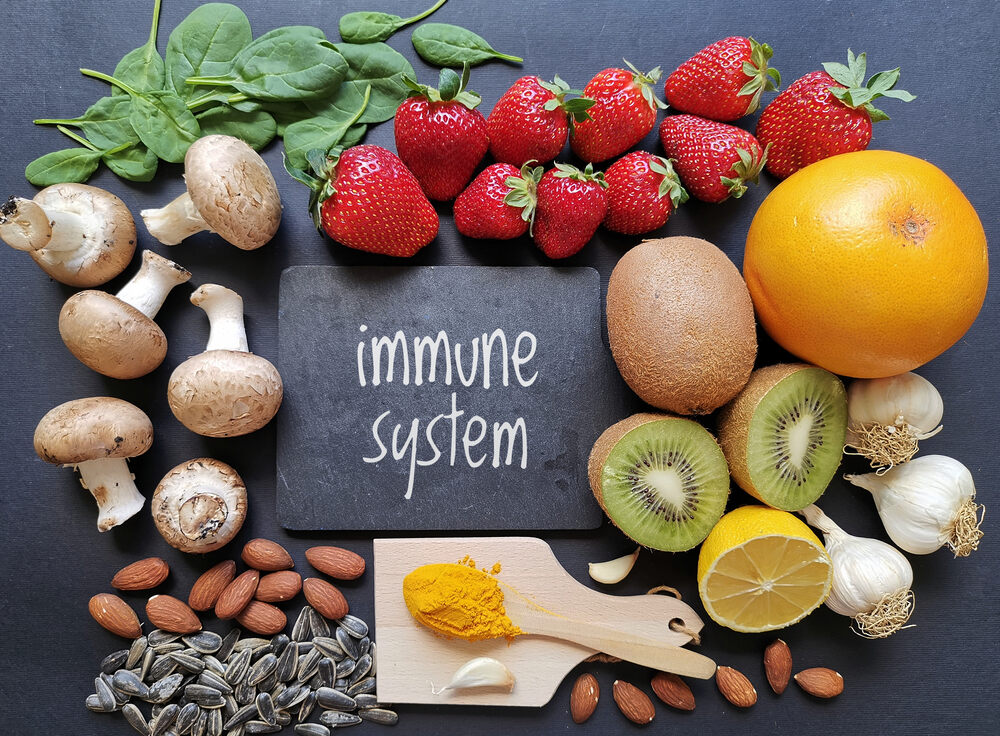
Let us learn how to increase white blood cells with a variety of delicious and nutrient-packed foods that can supercharge your immunity and enhance your overall health.
- Garlic - "The Mighty Bulb"
This pungent herb is not only a culinary delight but also a natural immune booster. Garlic contains sulfur compounds like allicin that stimulate the production of eosinophils, lymphocytes, and macrophages; an abundance of vitamins C and B6; and minerals like selenium and manganese that activate white blood cells and enhance their disease-fighting capabilities. You can use garlic to flavor your savory dishes, stir-fries, and sauces while also giving your immune system a delicious boost (7),(8).
- Spinach
Popeye had the right idea with his spinach obsession! This leafy green vegetable is a nutritional powerhouse, providing a wide range of essential nutrients, including vitamins A, C, E, and K, and minerals like iron, selenium, magnesium, and zinc. These vitamins and minerals, along with the beta-carotene found in spinach, promote the growth and activation of white blood cells and the functioning of neutrophils, lymphocytes, and macrophages (7),(9). Add spinach to your salads, soups, or sautés to fuel your immune system.
- Vegetables
Certain vegetables, such as tomatoes, bell peppers, mushrooms, broccoli, spinach, kale, and beans, are considered whole foods that can modulate the immune system and promote immunity against diseases. Broccoli contains a compound called sulforaphane, which is known to boost WBC count, and red bell peppers have an abundance of vitamin C, which is immune-boosting (10),(11).
Vegetables like cabbage, cauliflower, and Brussels sprouts contain isothiocyanates, which have antimicrobial properties and aid in regulating gut metabolism. Mushrooms, particularly Shiitake mushrooms, contain lentinan, an immunomodulating component that activates the immune system. Lentinan has shown promising results in the treatment of hepatitis B patients (7).
- Citrus Fruits - "Vitamin C Champions"
When it comes to bolstering white blood cells, vitamin C is the star nutrient. Citrus fruits like kiwis, oranges, grapefruits, lemons, sweet limes, and noni fruit are bursting with this immune-boosting vitamin.
Vitamin C is critical for our immune system, particularly immune cell function. It increases the production of white blood cells that kill pathogens, speeds up the movement of a particular type of white blood cell called neutrophils to the site of infection, and promotes immune cells' ability to engulf and destroy harmful microorganisms. Overall, vitamin C helps strengthen our immune system (12). Begin your day with a refreshing glass of citrus juice, or add slices of these fruits to your salads and snacks for a tangy immunity boost!
- Berries
Although small, berries like strawberries, blueberries, and raspberries have a big impact on the health of your white blood cells. These vibrant fruits, which are abundant in antioxidants and flavonoids, aid in preventing inflammation and damage to immune cells. Give your white blood cells a tasty treat by adding a colorful berry mixture to your yogurt, smoothies, or breakfast bowls (7),(10).
- Papaya Leaves
Though not tasty, these leaves are ideal for viral fevers like dengue. Papaya leaves contain papain and flavonoids (anti-inflammatory properties), vitamins C, A, and minerals; folate (helps in the production of WBCs); carotenoids like beta-carotene, lutein, and zeaxanthin (antioxidant properties); alkaloids such as carpaine and pseudocarpaine (anti-microbial in nature); and healthy dietary fiber, which together supplement your immunity (7),(13).
- Yogurt
A healthy gut leads to a healthy immune system, and that's where yogurt comes into play. Packed with beneficial probiotics, and proteins, yogurt helps maintain a balanced gut microbiome and healthy WBCs, which are crucial for optimal immune function (14). Look for yogurt with live cultures and enjoy it as a snack or as a base for smoothies and parfaits to keep your white blood cells happy and active.
- Healthy Fats: Omega-3 Fatty Acids
This healthy polyunsaturated fat (PUFA) is abundant in nuts (almonds and walnuts), seeds (flax seeds and sunflower seeds), and fish oils. Omega-3 fatty acids play a role in regulating immune signaling pathways and influencing the activation and behavior of WBCs. They can help modulate the production and release of immune molecules, promoting a well-coordinated immune response.
Nuts and seeds are also good sources of vitamin E, vitamin B, selenium, and essential amino acids, all of which work as antioxidants and anti-inflammatory agents and are good for boosting immunity (15).
Conclusion
Rudolf Virchow said, “The laboratory of the blood is the mirror of disease." Blood tests, done bi-annually are often necessary to keep track of ongoing or developing diseases in the body. A deviation in the test results should be a matter of concern and demand immediate action. Having learned a great deal about the unsung warriors of our immune system – the WBCs must be taken care of. Understand how to increase white blood cells and adopt foods to increase white blood cells for a healthier and stronger body. If you have had a recent history of debilitating diseases and are looking for a speedy recovery, then nothing could help more than an immunity-boosting supercharged nutrient bowl.
ALSO READ: The Best Diet for High Blood Pressure for Your Health





 JOIN OUR WHATSAPP CHANNEL
JOIN OUR WHATSAPP CHANNEL



































